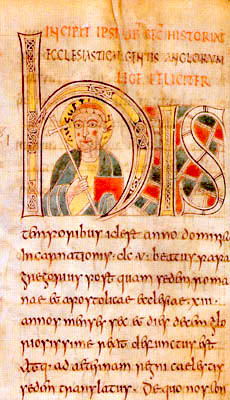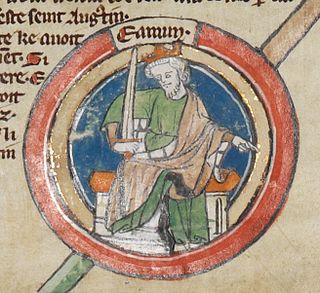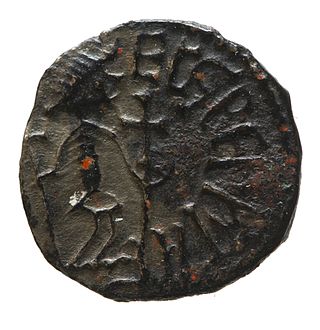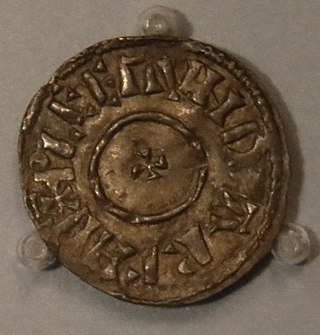Related Research Articles

Alfred the Great was King of the West Saxons from 871 to 886, and King of the Anglo-Saxons from 886 until his death in 899. He was the youngest son of King Æthelwulf and his first wife Osburh, who both died when Alfred was young. Three of Alfred's brothers, Æthelbald, Æthelberht and Æthelred, reigned in turn before him. Under Alfred's rule, considerable administrative and military reforms were introduced, prompting lasting change in England.

Augustine of Canterbury was a Christian monk who became the first archbishop of Canterbury in the year 597. He is considered the "Apostle to the English" and a founding figure of the Church of England.

Bede, also known as Saint Bede, The Venerable Bede, and Bede the Venerable, was an English monk and an author and scholar. He was one of the greatest teachers and writers during the Early Middle Ages, and his most famous work, Ecclesiastical History of the English People, gained him the title "The Father of English History". He served at the monastery of St Peter and its companion monastery of St Paul in the Kingdom of Northumbria of the Angles.

Edmund I or Eadmund I was King of the English from 27 October 939 until his death. He was the elder son of King Edward the Elder and his third wife, Queen Eadgifu, and a grandson of King Alfred the Great. After Edward died in 924, he was succeeded by his eldest son, Edmund's half-brother Æthelstan. Edmund was crowned after Æthelstan died childless in 939. He had two sons, Eadwig and Edgar, by his first wife Ælfgifu, and none by his second wife Æthelflæd. His sons were young children when he was killed in a brawl with an outlaw at Pucklechurch in Gloucestershire, and he was succeeded by his younger brother Eadred, who died in 955 and was followed by Edmund's sons in succession.

The Jutes were one of the Germanic tribes who settled in Great Britain after the departure of the Romans. According to Bede, they were one of the three most powerful Germanic nations, along with the Angles and the Saxons:
Those who came over were of the three most powerful nations of Germany—Saxons, Angles, and Jutes. From the Jutes are descended the people of Kent, and of the Isle of Wight, and those also in the province of the West Saxons who are to this day called Jutes, seated opposite to the Isle of Wight.
Old English literature refers to poetry and prose written in Old English in early medieval England, from the 7th century to the decades after the Norman Conquest of 1066, a period often termed Anglo-Saxon England. The 7th-century work Cædmon's Hymn is often considered as the oldest surviving poem in English, as it appears in an 8th-century copy of Bede's text, the Ecclesiastical History of the English People. Poetry written in the mid 12th century represents some of the latest post-Norman examples of Old English. Adherence to the grammatical rules of Old English is largely inconsistent in 12th-century work, and by the 13th century the grammar and syntax of Old English had almost completely deteriorated, giving way to the much larger Middle English corpus of literature.

Northumbria was an early medieval Anglo-Saxon kingdom in what is now Northern England and south-east Scotland.

Edgar was King of England from 959 until his death. He became king of all England on his brother's death. He was the younger son of King Edmund I and his first wife Ælfgifu. A detailed account of Edgar's reign is not possible, because only a few events were recorded by chroniclers and monastic writers were more interested in recording the activities of the leaders of the church.

Eadred was King of the English from 26 May 946 until his death. He was the younger son of Edward the Elder and his third wife Eadgifu, and a grandson of Alfred the Great. His elder brother, Edmund, was killed trying to protect his seneschal from an attack by a violent thief. Edmund's two sons, Eadwig and Edgar, were then young children, so Eadred became king. He suffered from ill health in the last years of his life and he died at the age of a little over thirty, having never married. He was succeeded successively by his nephews, Eadwig and Edgar.

Æthelstan or Athelstan was King of the Anglo-Saxons from 924 to 927 and King of the English from 927 to his death in 939. He was the son of King Edward the Elder and his first wife, Ecgwynn. Modern historians regard him as the first King of England and one of the "greatest Anglo-Saxon kings". He never married and had no children; he was succeeded by his half-brother, Edmund I.

Halfdan Ragnarsson was a Viking leader and a commander of the Great Heathen Army which invaded the Anglo-Saxon kingdoms of England, starting in 865.

Ecgbert was an 8th-century cleric who established the archdiocese of York in 735. In 737, Ecgbert's brother became king of Northumbria and the two siblings worked together on ecclesiastical issues. Ecgbert was a correspondent of Bede and Boniface and the author of a legal code for his clergy. Other works have been ascribed to him, although the attribution is doubted by modern scholars.
Nothhelm was a medieval Anglo-Saxon Archbishop of Canterbury. A correspondent of both Bede and Boniface, it was Nothhelm who gathered materials from Canterbury for Bede's historical works. After his appointment to the archbishopric in 735, he attended to ecclesiastical matters, including holding church councils. Although later antiquaries felt that Nothhelm was the author of a number of works, later research has shown them to be authored by others. After his death he was considered a saint.

Tatwine was the tenth Archbishop of Canterbury from 731 to 734. Prior to becoming archbishop, he was a monk and abbot of a Benedictine monastery. Besides his ecclesiastical career, Tatwine was a writer, and riddles he composed survive. Another work he composed was on the grammar of the Latin language, which was aimed at advanced students of that language. He was subsequently considered a saint.
Sigeric was the Archbishop of Canterbury from 990 to 994. Educated at Glastonbury Abbey, he became a monk there before becoming an abbot and then Bishop of Ramsbury before his elevation to the archbishopric. An account of his pilgrimage to Rome in 990 survives and is an important source for historians studying Rome during his lifetime.
Simon Douglas Keynes, is a British author who is Elrington and Bosworth Professor of Anglo-Saxon emeritus in the Department of Anglo-Saxon, Norse, and Celtic at Cambridge University, and a Fellow of Trinity College.

Plegmund was a medieval English Archbishop of Canterbury. He may have been a hermit before he became archbishop in 890. As archbishop, he reorganised the Diocese of Winchester, creating four new sees, and worked with other scholars in translating religious works. He was canonised after his death.
Richard Sharpe,, Hon. was a British historian and academic, who was Professor of Diplomatic at the University of Oxford and a fellow of Wadham College, Oxford. His broad interests were the history of medieval England, Ireland, Scotland and Wales. He had a special concern with first-hand work on the primary sources of medieval history, including the practices of palaeography, diplomatic and the editorial process, as well as the historical and legal contexts of medieval documents. He was the general editor of the Corpus of British Medieval Library Catalogues, and editor of a forthcoming edition of the charters of King Henry I of England.

Frithegod, was a poet and clergyman in the mid 10th-century who served Oda of Canterbury, an Archbishop of Canterbury. As a non-native of England, he came to Canterbury and entered Oda's service as a teacher and scholar. After Oda's death he likely returned to the continent. His most influential writing was a poem on the life of Wilfrid, an 8th-century bishop and saint, named Breviloquium Vitae Wilfridi. Several manuscripts of this poem survive, as well as a few other of Frithegod's poems. He was also known for the complexity of his writings, with one historian even calling them "damnably difficult".

The hermeneutic style is a style of Latin in the later Roman and early Medieval periods characterised by the extensive use of unusual and arcane words, especially derived from Greek. The style is first found in the work of Apuleius in the second century, and then in several late Roman writers. In the early medieval period, some leading Continental scholars were exponents, including Johannes Scotus Eriugena and Odo of Cluny.
References
- ↑ Leach, Arthur Francis (2013-04-18). Early Yorkshire Schools. Cambridge University Press. ISBN 978-1-108-05858-2.
- ↑ Allen Rogers Benham (1916). English literature from Widsith to the death of Chaucer: a source book. Yale University Press. p. 68.
- ↑ Michael Lapidge (26 January 2006). The Anglo-Saxon Library. Oxford University Press. pp. 229–231. ISBN 978-0-19-153301-3.
- ↑ Mary P. Richards (2001). Anglo-Saxon Manuscripts: Basic Readings. Taylor & Francis. pp. 105–112. ISBN 978-0-8153-3567-2.